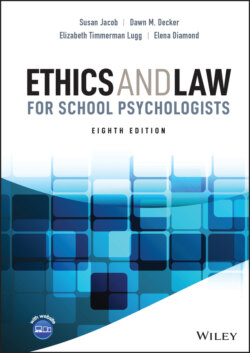Читать книгу Ethics and Law for School Psychologists - Susan Jacob - Страница 74
Freedom of Speech and Assembly
ОглавлениеThe First Amendment prohibits the government from interfering with the rights of free speech and assembly and freedom of religious choice. In Tinker and subsequent cases, the courts generally have acknowledged the right of students to free speech and assembly, as long as the exercise of those rights does not significantly interfere with or disrupt the functioning of the school. Freedom of speech and assembly can be restricted when their exercise “materially and substantially” interferes with schooling. The right to free speech does not protect the use of “obscene” language, gestures, or materials (Bethel School District No. 403 v. Fraser, 1986); speech promoting drug use (Morse v. Frederick, 2007); or speech that includes true threats (D. J. M. v. Hannibal Public School District #60, 2011).
In 2021, more than 50 years after the Tinker decision, the U.S. Supreme Court considered whether public elementary and secondary schools have a right to discipline students for off-campus speech (on social media) in Mahanoy Area School District v. B.L (Case 2.1). As you read Case 2.1, consider how the Court carefully balanced the free speech rights of a ninth-grade student with the interests of a public school in maintaining order to foster learning.
